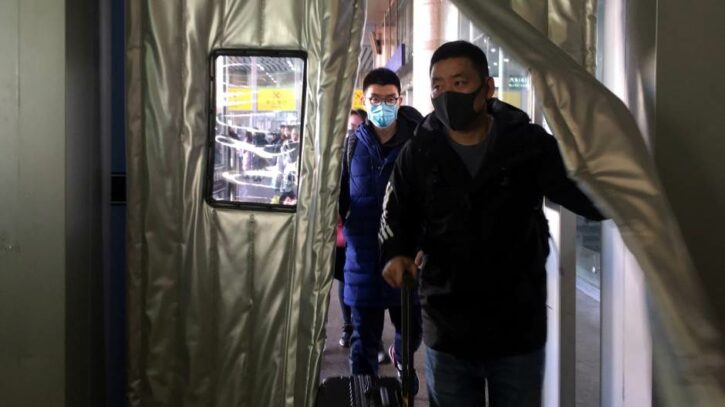
China has reported 139 new cases of pneumonia caused by a new strain of coronavirus, including a third death, as the outbreak spreads beyond the city where the virus was first identified.
Health authorities in Beijing confirmed two cases of the new coronavirus Monday, while Guangdong authorities reported one case in Shenzhen — the first confirmation from authorities that the mysterious virus has spread domestically beyond the central city of Wuhan. All three patients are believed to have visited Wuhan, according to authorities.
South Korea also confirmed its first case of the virus Monday — the third country affected by the outbreak, following Thailand and Japan.
According to the South Korean Centers for Disease Control and Prevention (CDC), a 35-year-old Chinese woman was detected by temperature screening upon arriving Sunday at Seoul's Incheon International Airport from Wuhan. She has been quarantined and is in a stable condition, the CDC said.
The woman, a Wuhan resident, had planned to go on holiday in South Korea and Japan with five others. She said she developed a fever and muscle pains on Saturday and was prescribed cold medicine by a doctor in Wuhan, according to the CDC.
The Wuhan Municipal Health Commission announced Monday that 136 new patients were diagnosed on Saturday and Sunday. Of those, one person died from the virus, two are in critical condition, and 33 are in serious condition, according to authorities.
The new cases have brought the total number of people in China diagnosed with the virus to 201, a significant jump from 62 reported on the weekend.
Local authorities have also begun to report suspected infections. On Monday morning, health authorities in Shenzhen, across the border of Hong Kong, said they are monitoring 8 patients who have been quarantined for treatment. In coastal Zhejiang province, authorities reported five suspected cases who visited Wuhan.
The spread of the outbreak comes as the country gets ready for the Lunar New Year holiday later this week. The holiday period typically sees hundreds of millions of Chinese travel throughout the country and overseas.
Last week, three cases were detected outside China — two in Thailand and one in Japan. All cases have been linked to Wuhan.
“I believe Chinese tourists will bring the virus to many other countries in Asia in the coming days, due to their overseas travels during the Lunar New Year holiday,” Professor David Hui Shu-cheong, a respiratory expert at the Chinese University of Hong Kong, told CNN.
The pneumonia outbreak emerged last month in Wuhan, the largest city in central China and a major transportation hub. Officials in China have linked the viral infections to a Wuhan seafood and wildlife market, which has been closed since January 1 to prevent further spread of the illness.
Chinese scientists on January 8 identified the pathogen as a new strain of coronavirus, in the same family of the deadly severe acute respiratory syndrome (SARS).
The WHO said in a tweet Sunday that “according to the latest information received and WHO analysis, there is evidence of limited human-to-human transmission” of the new virus.
“This is in line with experience with other respiratory illnesses and in particular with other coronavirus outbreaks,” it added.
While the new virus has not shown death rates like SARS — which infected more than 8,000 people and killed 774 in a pandemic that ripped through Asia in 2002 and 2003 — a new study by Imperial College London suggests the number of infections in Wuhan is likely to have been grossly underestimated.
“The detection of three cases outside China is worrying. We calculate, based on flight and population data, that there is only a 1 in 574 chance that a person infected in Wuhan would travel overseas before they sought medical care. This implies there might have been over 1,700 cases in Wuhan so far,” Imperial College London's Neil Ferguson, a disease outbreak scientist, told CNN.
On Friday, the US Centers for Disease Control and Prevention announced three US airports — in New York, San Francisco and Los Angeles — will start screening passengers arriving from Wuhan to check for signs of the new virus, following similar measures taken by governments in Asia.
In Wuhan, infrared thermometers have been installed at the airport, train stations, coach terminals and passenger piers to measure the temperature of passengers departing the city since January 14, Chen Xiexin, deputy mayor of Wuhan, was quoted as saying by state-media China Daily on Sunday.
The measures were only imposed five weeks after the onset of the outbreak, with countless passengers having left the city without screening.
CNN's Eric Cheung, Yoonjung Seo and Angela Dewan contributed to this report.




